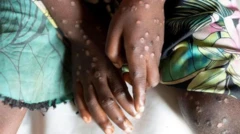Photo credit, Reuters
Article information
- Author, Natasha Preskey
- Role, BBC World Service
-
an hour ago
A new variant of the mpox virus has caused hundreds of deaths in the Democratic Republic of Congo (DRC) and has since spread to parts of Central and East Africa.
Earlier this month, the World Health Organization (WHO) declared the outbreak a public health emergency of international concern.
It is caused by a relatively new and more serious type of mpox virus, known as Clade 1b.
WHO said ensuring vaccines reach the areas most in need is critical to combating the outbreak.
But what do we know about the smallpox vaccine and who should benefit from it?
Also read on BBC Africa:
Is there a vaccine against smallpox?
There are two WHO-recommended vaccines for mpox – formerly known as monkeypox – but many countries have not yet approved their use.
WHO recommends MVA-BN or LC16 vaccines, or ACAM2000 vaccine when others are not available.
Earlier this month, the organization triggered the emergency use listing process for monkeypox vaccines to help low-income countries that have not yet officially approved them gain faster access.
This categorization allows organizations such as UNICEF and Gavi to collect and distribute vaccines.
WHO does not currently recommend mass vaccination. It suggests targeting people at risk, those who have had close contact with someone with smallpox, and those living in communities affected by outbreaks.
If your health care provider determines that you are at risk because of your travel plans, WHO says you may want to consider getting vaccinated.
Last week, the European Centre for Disease Prevention and Control (ECDC) recommended that travellers consider getting vaccinated if they plan to travel to affected areas in Africa.
People who have already been vaccinated against smallpox may only need one booster dose, instead of two.
Booster doses of vaccine are generally recommended every two to ten years if the person remains at risk of exposure.
Does the old smallpox vaccine protect against smallpox?
Smallpox is caused by a virus from the same family as variola.
A smallpox vaccine given to many older people may offer some protection.
The WHO declared smallpox eradicated in 1980 (the only infectious disease to achieve this status) and the vaccine was abandoned more than forty years ago.
Is there enough smallpox vaccine?
Photo credit, Reuters
The Africa Centers for Disease Control and Prevention said it has a “clear plan” to secure 10 million vaccine doses for the continent by 2025.
The DRC and Nigeria will begin vaccinating from next week, with the DRC using doses from the United States and Japan, and Nigeria using vaccines from the United States.
Democratic Republic of Congo’s health minister Roger Kamba said children would be vaccinated first because the rate of MPOX infection was higher among those under 15.
The Africa Centres for Disease Control and Prevention said it has reached an agreement with a Danish manufacturer, Bavarian Nordic, to use its technology to produce vaccines on the African continent.
The WHO recently asked drug manufacturers to offer their smallpox vaccines for emergency use, even though the vaccines have not been officially approved.
Nigeria said it expected to receive its first batch of 10,000 vaccines from the US government on Tuesday.
The Democratic Republic of Congo says the United States has pledged 50,000 doses, while Japan has said it will provide 3.5 million.
Is the smallpox vaccine effective?
According to the WHO, vaccines against the mpox virus “provide some level of protection against infection and serious disease.”
Earlier this week, WHO regional director for Europe Dr Hans Kluge said smallpox was not “the new Covid” – despite the new variant – because it could be controlled through non-discriminatory public health action and equitable access to vaccines.
WHO recommends avoiding getting or spreading smallpox after being vaccinated, as it takes several weeks to develop immunity after vaccination. Some people may not respond to the vaccine.
If you get smallpox even after being vaccinated, the vaccine provides protection against serious illness and hospitalization.
